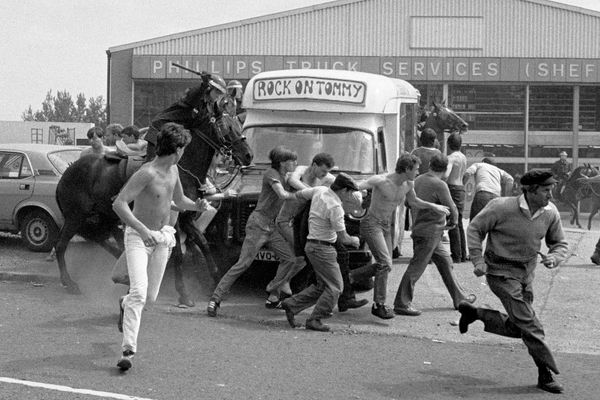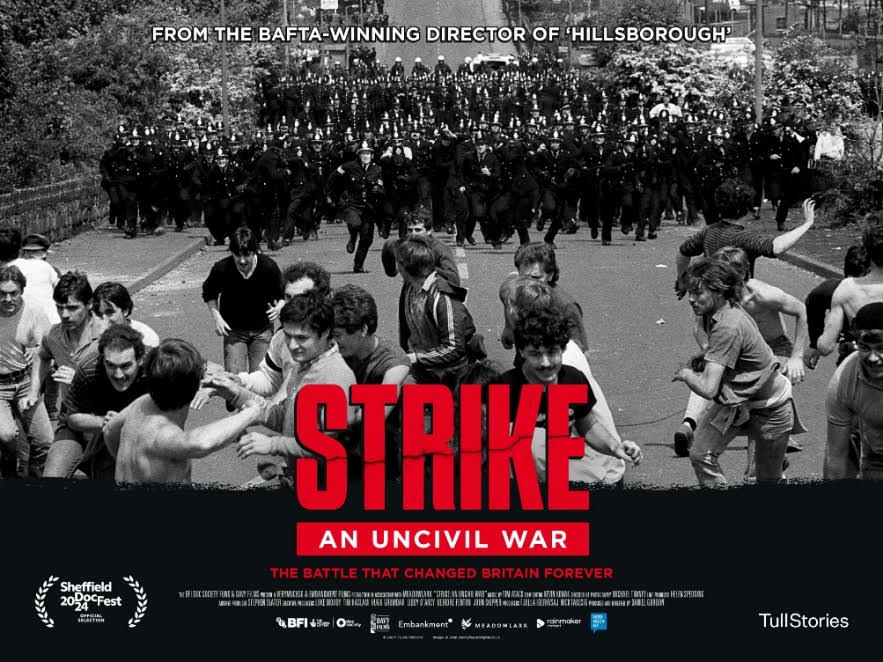Eye For Film >> Movies >> Strike: An Uncivil War (2024) Film Review
Strike: An Uncivil War
Reviewed by: Amber Wilkinson

Writing this on the 40th anniversary of what became known as the Battle of Orgreave makes you aware of how time can seem to collapse in on itself sometimes. The thick-rimmed spectacles, mullets and perms in the archive footage may be rooted in the past but in other ways - and especially in terms of political rhetoric - four decades feels almost like a heartbeat away. Certainly that’s how close it seems emotionally for many of the interviewees in Daniel Gordon’s powerful and thorough documentary. The film had its world premiere at Sheffield DocFest, where it won the Audience Award - don’t assume that accolade is simply a result of its relevance to the city, the strength of the testimony in Strike is likely to win people over, wherever it is screened.
The events surrounding a police confrontation with pickets at the South Yorkshire coking plant on June 18, 1984, are the centrepiece of a film which steps back in time to consider the knock-on effects of strikes in 1972 and 74 before outlining what happened post-Orgreave.

At the time of the clashes things had come to a head between the Conservative government and the miners. Threatened with pit closures up and down the UK, the workers and their families were, for the most part, standing in solidarity against it in a bid to protect their communities. It was, so the miners thought, just a reprise of the stance they’d had to take 12 and 10 years earlier to protect their livelihoods. As one interviewee says in one of the excellent pieces of archive reportage that’s intercut with the talking heads of some of those involved, “There’s only the pits holding this place together.”
Gordon’s film doesn’t stint on detail, letting miners recount the dangers often faced down the pit. One recalls picking up “a few fingers” over the years, putting them in a crisp packet and sending them up top to be stitched back on. Another remembers someone getting their head knocked off, at just 17, after not being careful enough on one of the conveyor belts they used for transportation underground.
Orgreave became a flashpoint because it was where trucks were being sent to pick up coke to fuel Scunthorpe steelworks (and those interested in that industry may find The Big Melt a good companion piece to this). Thousands of miners headed out on a sunny June morning to make a stand, little realising what Margaret Thatcher’s government had in mind.
Gordon’s film makes the case that the Tories had been badly stung by the triumph of the miners back in the Seventies. Moreover, they had been making plans to get tough, drawing on the more “paramilitary” style of policing in colonial areas like Hong Kong and even going so far as to produce a “manual for chiefs’ eyes only” on the downlow, signed off by the home secretary without the scrutiny of Parliament. That’s just one of many things that may sound all too familiar in our current electoral cycle.
The documentarian is to be praised for trying to round out the perspectives. There are interviews with both miners and police officers recalling the day, as well as some of the women who also worked in subsidiary jobs at the pit, such as the canteens, joined picket lines and, of course, supported their families. The men talk about how strange it was that they were welcomed by police, little realising at the time that around 6,000 police officers had been drafted in, including horseback police and dog units.
As the strikers give first-person testimony of what happened to them on the day, the case made by the media, Thatcher and police chiefs at the time is also presented. This makes it possible to see the discrepancies between the spin and the reality. The police chief claimed the police were merely responding to attacks by the miners but the footage shows aggression by officers, some charging on horsebacks, others deployed with small shields and batons to subdue violence that wasn’t much in evidence. One miner outlines how tooled up the cops were, noting that all they had, by contrast, was “shorts and a T-shirt”. The brutality of the day brought 95 arrests - in a case which would later collapse for many of the reasons this documentary presents in detail.
Gordon takes his time. The pace is measured and the score from Tim Atack avoids any bombastic ramping of the mood. It’s not needed since the miners’ testimony is perfectly able to convey the terror of that day and the trauma of the strike more widely. Again, Gordon gives them time to respond, waiting for testimony as some become choked up with emotion, rather than simply rushing on to the next talking head. While this will find plenty of resonance with those who remember the period, it is also a comprehensive guide for those who don't.
As Gordon considers the aftermath of Orgreave, there are also detailed recollections of the splitting of communities and families as a result of some opting to return to work and becoming branded “scabs” for life. Equally, those miners who stayed out when others went back, reaped the whirlwind once the strike finally ended.
Beyond the poignancy of what is being recalled, is a more scathing judgement of the politics behind it all. Journalist Nick Jones acknowledges that the Tories were allowed to lead the narrative that the media followed - although he also notes that NUM leader Arthur Scargill’s judgement was also flawed in this regard. When Thatcher talks about “the enemy within”, it’s hard not to hear the echoes in much of the current right-wing rhetoric concerning the right to protest. Answers are still sought over Orgreave, with Labour recently pledging it will hold an inquiry if elected. This hard-hitting film suggests it would most certainly be in the public interest.
Reviewed on: 18 Jun 2024

















